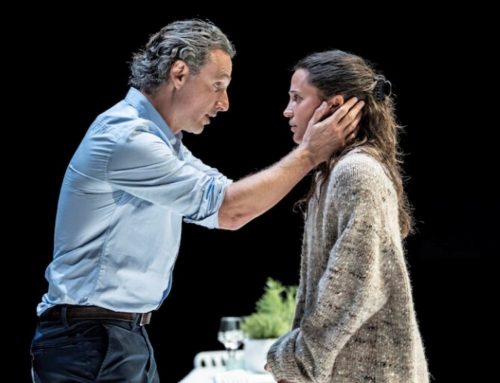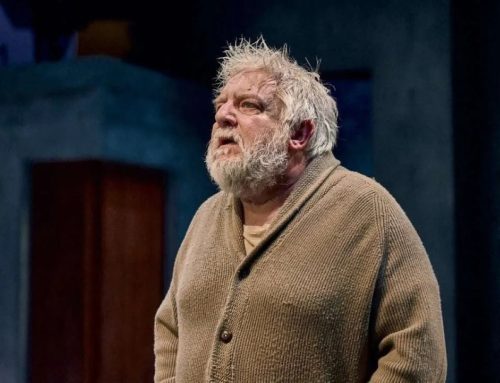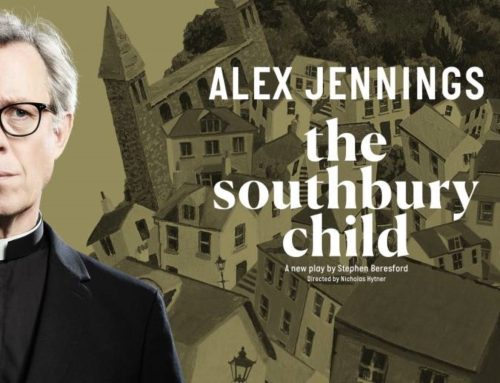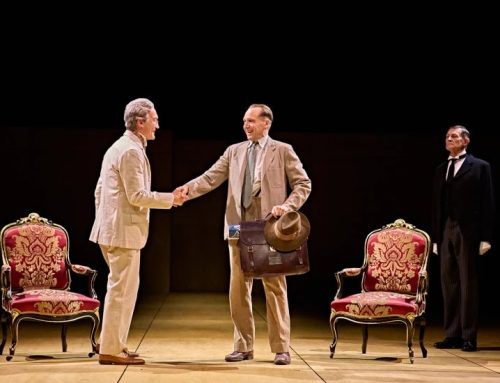Nicholas Hytner’s much-anticipated immersive revival of his hit 2019 production of A Midsummer Night’s Dream makes a deliriously witty return to the Bridge Theatre. Performed in the round, with much of the audience milling around on foot, the show portrays the court of Athens, headed by a black-suited, gun-toting Theseus, as a dystopian patriarchy straight out of The Handmaid’s Tale. Theseus’s bride-to-be, Queen of the Amazons, Hippolyta, makes her first appearance in a grotesque glass display cabinet. She is quite literally a trophy bride, devoid of female agency, in a world of men, run by men, for men. The funereal milieu, complete with hymn-singing grey-clad nuns, feels more like a wake than the run-up to wedding festivities. The warring lovers here are spoilt, ruling-class, teenage nepo-kids, cosplaying at love and doing the rich equivalent of hanging around a bus stop, devoid of obvious insight into the consequences of their actions.
It is a neat set-up for Hytner’s gender-subverted reworking of the narrative. Fairy King Oberon (JJ Field) retains his name and title, but swaps dialogue with his wife. Queen Titania (Susannah Fielding) is no longer the victim of the magical love-in-idleness flower, surely masculine power embodied, but an active instigator of her own mischief and poetic justice.
Hytner’s inverted storyline opens the way for differing interpretations of the play’s key themes of gender, power, and desire (although some may feel that Shakespeare needs no assistance in highlighting the caprices of male privilege). Titania becomes a woman who reshapes the forest realm on her terms, and in doing so, brings agency to her real-life doppelganger, Hippolyta. Dream-like recollections of humiliation at Titania’s hands subsequently soften Theseus’s autocratic expectations about women, too. There is balance, even justice here, even if the play’s internal logic and characterisation occasionally feels a little out of kilter.
For audiences, the impact of the gender switch is most gloriously felt in the opportunities opened up for gender-inverted, suitor-swapping and gag-filled farce. Lysander (Divesh Subaskaran) and Demetrius (Paul Adeyefa) get a magic-induced snog, as do Lily Simpkiss’s frumpy Helena and Nina Cassells’s savvy, streetwise Hermia. The spectacle of Field’s Oberon in a drug-induced pole-dance, while Emmanuel Akwafo’s magnificently oblivious Bottom twerks to a Beyoncé tune, will stay with you long after you leave the theatre. This may not be the most revelatory A Midsummer Night’s Dream you ever get to see (though Oberon’s flimsy thong threatens to reveal rather too much in one scene), but it is quite possibly the funniest.
The performances are almost entirely top-notch. The highlight amidst the comedy mayhem is surely Akwafo’s preening, unfiltered Bottom, who seems to find it entirely understandable that the king of the fairies would fall for him. “Not again, babes, I’ve got a headache”, he tells the amorous Oberon after what must have been a heavy night. Simpkiss plays Helena as a Joyce Grenfellish head-girl from a rural grammar school who is affronted and embarrassed by Demetrius’s refusal to love her, rather than heartbroken. Subaskaran’s guitar-carrying Lysander, who loves Hermia but then switches his affection to Helena (“God, you’re hot,” he tells her), oozes trust fund kid overconfidence. Adeyefa’s rather more conventional Demetrius feels a little at odds with the surrounding mayhem but brings some grounding to events.
Felicity Montagu’s motherly Quince coaxes, chides, and encourages her rude mechanical charges as if they were unwilling attendees at an uber-woke drama club in a youth offender’s institute. “It’s triggering,” says Dominic Semwanga’s boiler-suited Flute, explaining the need to remove swords from the wretchedly awful play the reluctant group is tasked to perform. David Moorst’s immensely agile Puck (bafflingly now afforded the middle name “Adrian”) is part cackling Newcastle fishwife, part Lord of The Rings Gollum, and part mischievous psychopath on an outing from an episode of TV’s Stranger Things. “You selfish bastard,” he yells at Lysander as he drops potion in the lad’s eyes – and he means it.
Arlene Phillips’ movement direction brims with wit, and the fight scenes are fantastic. Bunny Christie’s set is mostly beds of one sort or another. They rise, podium-like, from the stage as lullaby-singing fairies frolic above on white-shroud trapezes. There is a nod here, one supposes, to Peter Hall’s epoch-making, circus-set 1970s Dream production. One suspects this version will not end up being quite so influential as Hall’s, but you cannot fault it for laughs: Hytner’s forest fairy land is one you may feel reluctant to leave. This is an immensely welcome, hugely entertaining revival perfectly timed for Pride month.
Writer: William Shakespeare
Director: Nicholas Hytner
New – Online Shop!
My collected theatre reviews now available in paperback format for the years 2022 and 2023.
Just £10 per copy.
Over 100 reviews in each book.
- John Cutler’s Collected Theatre Reviews – Volume One. 2022. Paperback. 296 pages. ISBN 9781805179757. £10
-
John Cutler’s Collected Theatre Reviews – Volume Two. 2023. Paperback. 284 pages. ISBN 9781836884170. £10
Visit my Online Shop or click on Buy Now to order your copies.
More Recent Reviews
The Sea Horse. Golden Goose Theatre.
The Sea Horse, Edward J Moore’s grim slice of mid-century realism, debuted to solid reviews off-Broadway in 1974. Since [...]
Garry Starr: Classic Penguins. Arts Theatre.
Emperor penguins’ shortish treks between sea and nesting sites are about as peripatetic as your average Thameslink commuter. Garry [...]
When the Clarion Came to Call. Cockpit Theatre.
When, upon entering an auditorium, you are told, ‘Take as many pictures as you like, but mind the ceramics,’ [...]








